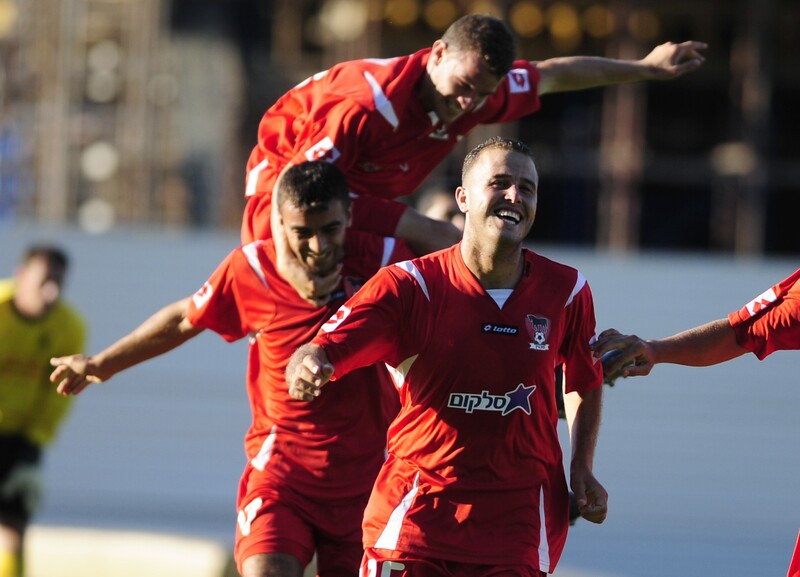The Electronic Intifada 23 October 2020

Although he has stopped playing professional football, Khalid Khalaila (front) still receives racist messages on his mobile phone.
ReutersBnei Sakhnin is by far the most successful football club mainly comprised of Palestinians living inside Israel.
It has won Israel’s State Cup and competed in the UEFA Europa League. The team’s tenacity has earned it many admirers and even inspired a movie.
The occasional triumphs it has enjoyed do not, however, erase a grim reality for the team: Its players and supporters are regularly subjected to racist abuse.
Khalid Khalaila spent about 20 years as a midfielder with Bnei Sakhnin and was the team’s captain for a decade. He was also part of the side which won the State Cup in 2004.
Despite having stopped playing professional football, he still receives hostile messages on his mobile phone.
Almost certainly, the messages come from fans of Beitar Jerusalem. Typically, they call Khalid a “dirty Arab” and curse his family.
Skeptical
Beitar’s supporters have hurled insults at Bnei Sakhnin whenever the two sides have played against each other.
The insults have effectively been endorsed by top-level Israeli politicians.
Miri Regev, then Israel’s minister for sports and culture, posted a video on Facebook in 2018 of her attending a match between Beitar and Bnei Sakhnin. In the video, Regev could be seen smiling broadly as Beitar’s supporters chanted “may your village be burned.”
Beitar has been reprimanded and penalized by Israel’s football authorities over the conduct of its fans. Yet Khalid is skeptical about whether the authorities really want to kick racism out of football.
“We keep on hearing ‘death to the Arabs’ and other slogans being chanted,” he said. “The Israel Football Association imposes sanctions but unfortunately the sanctions don’t prevent the abuse. They are just formalities.”
Khalid remains among the best known players in the history of Bnei Sakhnin, which is based in the Galilee region.“I played quite a strong, physical game,” he said. “Some people called me a rough player. I drew a lot of attention and that may explain why I got a lot of racist abuse.”
While Bnei Sakhnin mostly features Palestinian citizens of Israel, it also has a few Jewish Israelis and players from Colombia, Nigeria and Brazil.
“Determined”
Ali Othman, 33, is the team’s current captain.
The racist abuse he encounters can be so severe that he has taken steps to protect his safety. When the team is playing Beitar, he travels in a car separately from the rest of the squad, in an attempt to go unnoticed.
In his experience, players with Bnei Sakhnin are more exposed to racism than Palestinians selected by other teams in Israel.
Othman joined Bnei Sakhnin in 2006.
Three years later, he was transferred to Maccabi Haifa. The transfer enabled him to play against some of Europe’s best teams.
Othman stated that he was never subjected to racist abuse during his time with Maccabi Haifa. Yet when he returned to Bnei Sakhnin in 2012, Othman got another taste of how much the team is hated by some Israelis.
He is nonetheless doing what he can to rise above the racism targeting him.
“I do my best to stay positive when we hear racist slogans being chanted,” he said. “They chant nasty things about Arabs and the Prophet Muhammad. But the nastiness encourages me to try harder. It makes me more determined to win.”
Saeed Hasanein, a sports writer with the newspaper Kul al-Arab, said that “every Palestinian inside Israel is proud of Bnei Saknin, despite all the racism it is exposed to.”
“I have witnessed many incidents of racism against Arab players from the 1980s until now,” he added. “The Israel Football Association has never taken real action against this racism. We, Arabs, are a lower people as far as they are concerned. So they just turn a blind eye.”
Munther Khalaila, a spokesperson for Bnei Sakhnin, noted that when its fans hear “death to the Arabs” being shouted at games against Beitar, they respond by chanting “Allahu akbar.” Though that expression is widely misunderstood in the West, it simply means “God is the greatest” and is often used by Palestinians at times of celebration.
Bnei Sakhnin has kept going despite having financial difficulties recently. The support and sponsorship it has received from businesses has been inadequate.
Players have accepted a salary cut and some of its management work on a voluntary basis. Relegated last year, the club is now back in Israel’s premier league, although it has not had a good season so far.
Many Palestinian citizens of Israel identity with Bnei Sakhnin because they respect its spirit of defiance.
The town of Sakhnin witnessed battles between Zionist and Arab forces in 1948, the year of Israel’s foundation. While many of its residents fled during the Nakba – the ethnic cleansing of Palestine – a considerable number stayed put.
“Younger generations were born as citizens of Israel,” said Munther Khalaila. “We have lived with racism since our childhood. A lot of Israel’s football supporters don’t want us here.”
Amjad Ayman Yaghi is a journalist based in Gaza.





